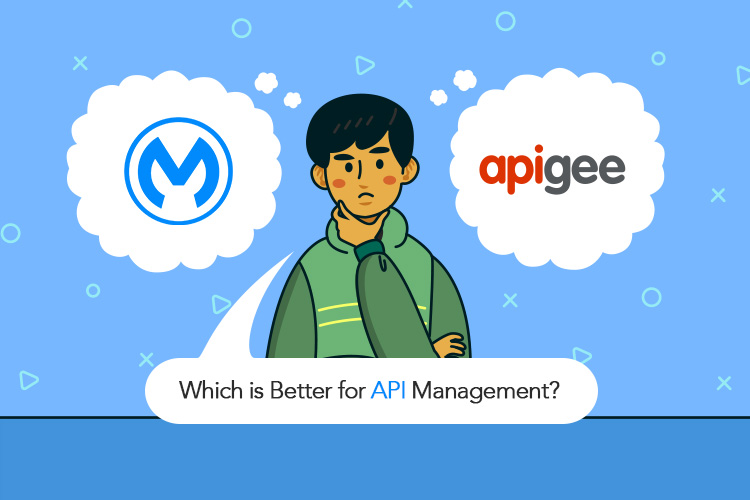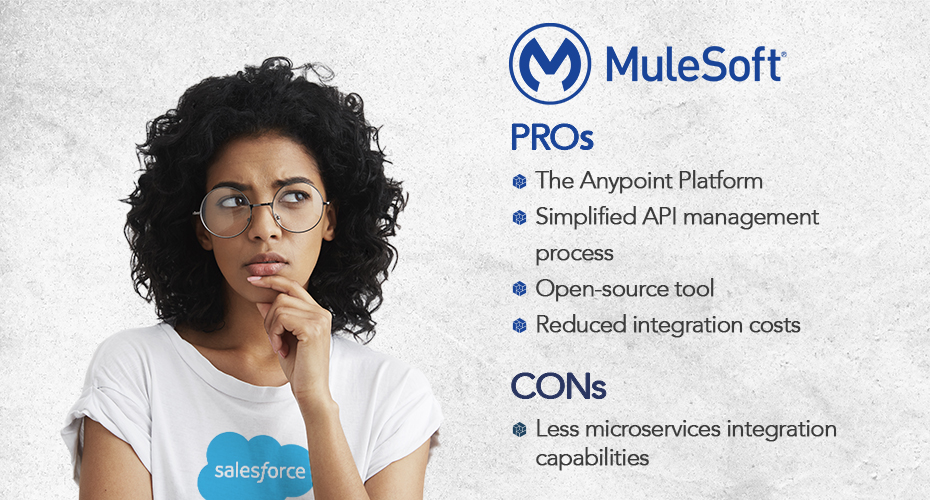Mulesoft vs. Apigee: Our take on API Integration & Management

MuleSoft API management vs. Apigee (2025)
In the past, Application Programming Interfaces (APIs) were not given as much emphasis as they were seen as something that is used only internally. However, in the modern marketplace, companies make their APIs available to other businesses to help provide the customer with more detailed information.
Today, businesses looking to create and manage their APIs have many APIs to choose from. The two main competitors for the top spot are Apigee vs. Mulesoft. Since APIs are becoming the preferred integration method, we thought it would be interesting to compare and contrast these two API management platforms.
What is API Management?
APIs are the driving force behind many services offered by businesses and allow companies to tap into a pool of skill sets that they might not have in-house. It all boils down to that APIs allow two applications to “communicate” and exchange data.
For instance, if you launch Google Maps, alongside your planned route, you'll also find the estimated Uber fare displayed, should you choose their service. This illustrates one of the many advantages that API integration provides to both businesses and their customers. We have made a list of additional benefits that companies can leverage through API connectivity.
Benefits of API Management

Expedite Transition to the Cloud through API connectivity
If you have a legacy system slowing down your innovation speed, moving it to the cloud could be the solution you are looking for.
The question is, how do you do this without disrupting essential business processes?
One of the exciting ways is through API connectivity. You can transition from on-premise to cloud infrastructure and then use that very same infrastructure to increase the pace of innovation. This can be especially useful if you are currently using point-to-point integration, which is much slower.
Expand to New Markets
Many companies take advantage of API usage to unlock their data and infrastructure to accommodate the necessary systems. Companies worldwide will be able to integrate with your product. You will provide your customers with more personalized and delightful experiences. You will deliver the right services at the right time with API solutions and leverage new channels to extend their brands.
Create a Scalable Infrastructure
Numerous major brands, including Spotify, Amazon, and Netflix, are witnessing unprecedented growth, largely attributed to their effective use of API solutions. These APIs enable them to meet the increasing demands efficiently. In the absence of APIs, these companies would face isolated systems and repetitive tasks. However, by employing reusable APIs along with microservices, they enhance the development and integration of existing systems, such as data warehouses and enterprise resource planning software, streamlining processes and boosting productivity.
Give Your Sales Reps a Boost
When your business receives an inquiry from a prospective client, the speed of your sales team's response is crucial. A lengthy response process increases the chances of the client choosing another provider. Therefore, enabling your sales representatives to quickly access information about potential customers significantly boosts the probability of successfully converting these inquiries into sales.
They will be able to contact the customer at the right time and have all the information they need to make the sale. This can be especially useful if you have any data in your CRM and connect it to a cloud service like AWS RDS for analysis.
Provide Better Experiences for Your Customers
When people visit a store or their website, they expect the items offered to be in stock. However, a customer will often make an order and later receive a notice that the item is unavailable. This problem occurs because of disparate systems and siloed data. You can use APIs to connect those systems and launch various omnichannel initiatives.
The Importance of Security in API Management
As APIs essentially act as gateways between different systems and data sources, they are potential targets for security breaches. Therefore, a robust API management solution must incorporate comprehensive security measures to safeguard sensitive data and ensure reliable operations. This includes implementing protocols for authentication, authorization, encryption, and threat detection.
Effective API security protects against common vulnerabilities such as data breaches, unauthorized access, and various cyber attacks. Additionally, it ensures compliance with regulatory standards like GDPR and HIPAA. As APIs continue to proliferate in the digital ecosystem, prioritizing their security is not just about protecting data; it's a strategic "must" that underpins trust and reliability in the digital services that you offer to your customers.

Mulesoft vs. Apigee: Which is Better for API Management
The Backstory
Mulesoft and Apigee are both established names in the IT world, but they are both owned by parent companies. Apigee was acquired in 2016 by Google, and Salesforce acquired Mulesoft in a blockbuster deal for $6.5 billion in 2018. Both Google and Salesforce have reasons for buying an API management service. This was a good acquisition for Google because it allowed them to enter the API market. Thanks to Apigee, they don’t have to include any of its capabilities in the cloud.
Mulesoft API Management
These products have dedicated services just for creating APIs and for the entire API lifecycle management. Mulesoft has the Anypoint Platform, an integrated development environment, but they also offer the API Manager, an API management solution, which is just for creating APIs and can be used by itself. Since Mulesoft's primary focus is helping companies increase the tempo of their digital transformations, its integration platform includes pre-built connectors for systems such as SAP, AWS, and of course, Salesforce.
Apigee API Management
The Apigee Edge is a single API management platform offered by Google. It allows for all of the functions that the Anypoint Platform also provides. Still, it includes an extra functionality for microservices management. Apigee is available for both on-premise and cloud use. Still, developers will have to know Swagger to use it.
The Pros and Cons of Apigee
The most significant benefit of Apigee is its usability. It is straightforward to use and has a visual interface. It allows for branding and supports JMS and SMTP functionality. It will also be easy to integrate Apigee with other platforms and provide constant updates and troubleshooting options. You will even use machine learning to obtain actionable insights to provide helpful information on scaling your needs.
The key downside of Apigee is its price. While they offer many service plans, one will cost you $500 a month, giving you 15 million application programming interface (API) calls monthly. Comparing this with Mulesoft, it comes in two editions: Community and Enterprise. Mulesoft itself is an open-source tool. The Community edition will provide you with the functionality to create APIs. We recommend migrating to the enterprise version if you are looking for more advanced features.

Pros and Cons of Mulesoft
The main benefit of Mulesoft API management is the Anypoint Platform. You will use it to quickly create new APIs and simplify the whole API management process. This will make all data readily available for mobile devices, web apps, and other connected devices. You can also use the Anypoint Platform to connect your legacy system with any SaaS software you use while reducing integration costs.
On the downside, Mulesoft has historically lagged slightly in microservice management. To address this, they introduced the Anypoint Service Mesh in their 2022 release, aiming to enhance their capabilities in this area. Nevertheless, Apigee is still considered to have a stronger offering in microservice management, maintaining its edge over Mulesoft in this specific aspect.

Choosing the One that’s Right for You
Since Mulesoft and Apigee are strong competitors, deciding which API management solutions will ultimately come down to the technical capabilities. If your company uses microservices, then Apigee would make more sense. However, Mulesoft is still far ahead in terms of integration capabilities. You should also consider the parent company that owns these two services. For example, if you use Salesforce or any of its products, such as Tableau or Krux, it would make sense to choose Mulesoft.
The same is true for Apigee. If you use the Google Cloud Platform, for example, it will make all the sense in the world to choose Apigee. Both Mulesoft and Apigee regularly roll out enhancements, so staying informed about their latest updates can provide a competitive advantage in API management.
Frequently Asked Questions
1. What is API Management?
API management involves overseeing the entire lifecycle of APIs, from creation to retirement. It includes the processes, tools, and technologies that enable an organization to securely and effectively manage its APIs.
2. What are the main differences between Mulesoft and Apigee?
Mulesoft excels in integration capabilities and is beneficial for companies heavily invested in Salesforce products. Apigee, on the other hand, offers superior microservices management and is ideal for those using Google Cloud Platform.
3. Is API Management only good for large enterprises?
No, businesses of all sizes can benefit from API management. For small and medium-sized enterprises, APIs can level the playing field by allowing them to access the same capabilities as larger companies.
4. Can APIs help in cost reduction?
Yes, APIs can reduce costs by enabling companies to leverage existing services and data rather than building everything from scratch. They also minimize maintenance overhead and promote reusability of services.


